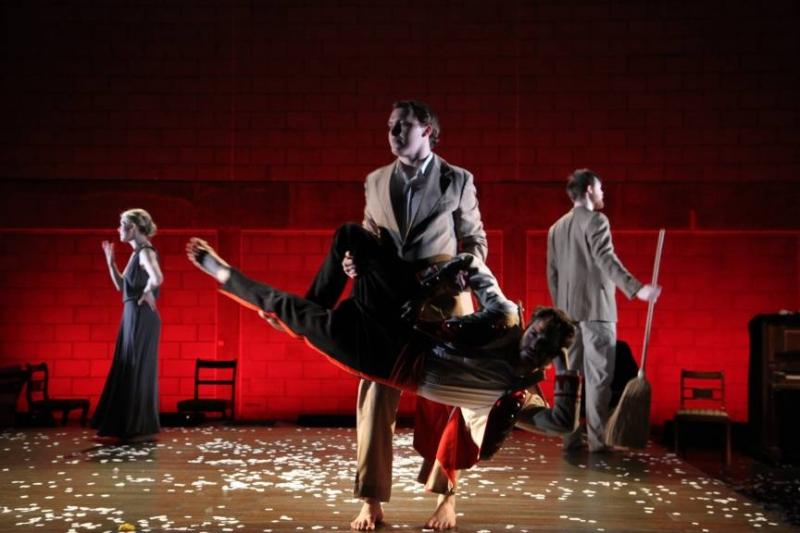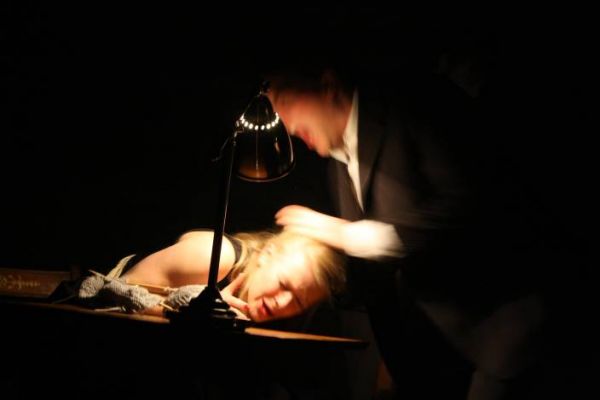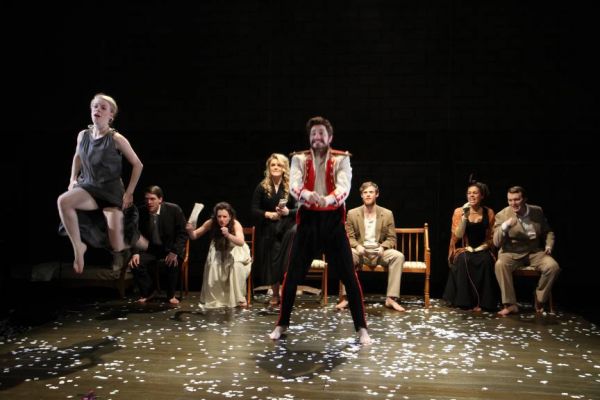Anna Karenina, Arcola Theatre | reviews, news & interviews
Anna Karenina, Arcola Theatre
Anna Karenina, Arcola Theatre
A beautiful but flawed staging of Helen Edmundson's elegant adaptation

Frankenstein, Pride and Prejudice, Tess of the D’Urbervilles, Great Expectations: it’s getting harder and harder to name a classic novel that hasn’t found itself covered in greasepaint and pushed out onto the stage.
“This is my story.”/ “It seems that it is mine too.” Framing the action of Tolstoy’s novel within an imagined dialogue between Levin and Anna, Edmundson's play makes a necessity of its own theatricality. Fragmenting the story, distilling it down to a carefully curated selection of episodes, she is able to translate almost a thousand pages, and a cast of nearly as many, into an intimate chamber drama. It’s an elegant achievement, a theatrical objective correlative that refuses to reproduce what it could reimagine far more vividly on its own terms.
Reworked since its original outing in Winchester back in 1992, I’d venture that a further 20 minutes could be stripped from the show without loss – testimony more to the author’s dramatic concision than any failure. We have our tragedy in place within the opening scene as we watch Anna (Elizabeth Twells) asleep, possessed in a violent dream-dance with a faceless man. Hers is the great solo love affair; neither Tolstoy nor Edmundson give Vronsky the weight to match her. Her yearning, as is made clear here, is not for the fulfilment of marriage or desire, a fulfilment she actively rejects, but for her own love-death, a surrender not to a man but tragedy itself.
 Director Max Webster has worked alongside Simon McBurney, and both the physicality of the production and its narrative pace owe a debt to Complicite. It’s a style of theatre that glories in the visual spectacle of a big budget, but whose playful ingenuity also relishes the constraints of a fringe production. Among the bare brick, steel and well-worn wood of the new Arcola space, a row of chairs become a ballroom, or a train; a bed suggests a sick room in a squalid lodging house, or an Italian palazzo.
Director Max Webster has worked alongside Simon McBurney, and both the physicality of the production and its narrative pace owe a debt to Complicite. It’s a style of theatre that glories in the visual spectacle of a big budget, but whose playful ingenuity also relishes the constraints of a fringe production. Among the bare brick, steel and well-worn wood of the new Arcola space, a row of chairs become a ballroom, or a train; a bed suggests a sick room in a squalid lodging house, or an Italian palazzo.
It’s an approach that demands much of its ensemble. With each scene change (and there are many) taking place in plain sight and at speed, we must be completely compelled by our characters, or risk losing them in the clamour of technical action. While the interplay of microphones, music, props, direct action and narrative frame does occasionally overwhelm, for the most part the company make a virtue of its process. A climactic debate between Anna, Levin and Vronsky must be shouted among a whirling peasant dance, its ancient music and rhythms carrying them along against their will. A proposal and a verdict are spliced painfully together, as focus cuts swiftly between Kitty and Levin and Anna and Karenin.
 The company of young graduates from the Birmingham School of Acting are clearly committed to the physicality of the production, making easy work of its more literal demands. A polished Anna from Twells gains much in her transformation into Frou-Frou, Vronsky’s highly strung mare (pictured left), and the eroticism and careful symbolism of the race scene is beautifully handled by Twells and Andy Rush’s Vronsky. All posing and pouting, a cardboard cut-out of a hero moved bodily from place to place without breaking position, the latter is a fairly thankless part, but one that Rush (with the aid of a suitably dashing moustache) plays with comedic good grace. He is balanced by Tristan Pate as Levin, fretful and restless, whose more generous writing and assured dramatic range occasionally threatens the balance with Twells’s Anna.
The company of young graduates from the Birmingham School of Acting are clearly committed to the physicality of the production, making easy work of its more literal demands. A polished Anna from Twells gains much in her transformation into Frou-Frou, Vronsky’s highly strung mare (pictured left), and the eroticism and careful symbolism of the race scene is beautifully handled by Twells and Andy Rush’s Vronsky. All posing and pouting, a cardboard cut-out of a hero moved bodily from place to place without breaking position, the latter is a fairly thankless part, but one that Rush (with the aid of a suitably dashing moustache) plays with comedic good grace. He is balanced by Tristan Pate as Levin, fretful and restless, whose more generous writing and assured dramatic range occasionally threatens the balance with Twells’s Anna.
It’s all rather accomplished, rather lovely (Vronsky and Anna waltzing in a haze of snow will linger in the eyes for a while) and rather young. There are some technical shortcomings, but it’s the very natural tension between the inexperience of the performers (a virtue in other contexts) and the considered maturity of Tolstoy’s characters that remains unresolved. For all their emotional urgency, the lovers of the novel have a sense of distance, of love recalled in experience. It’s an awareness that’s lacking here, through no fault of the cast, and one that denies this adaptation its full dramatic scope.
The future of Arts Journalism
You can stop theartsdesk.com closing!
We urgently need financing to survive. Our fundraising drive has thus far raised £49,000 but we need to reach £100,000 or we will be forced to close. Please contribute here: https://gofund.me/c3f6033d
And if you can forward this information to anyone who might assist, we’d be grateful.

Subscribe to theartsdesk.com
Thank you for continuing to read our work on theartsdesk.com. For unlimited access to every article in its entirety, including our archive of more than 15,000 pieces, we're asking for £5 per month or £40 per year. We feel it's a very good deal, and hope you do too.
To take a subscription now simply click here.
And if you're looking for that extra gift for a friend or family member, why not treat them to a theartsdesk.com gift subscription?
more Theatre
 Hamlet, National Theatre review - turning tragedy to comedy is no joke
Hiran Abeyeskera’s childlike prince falls flat in a mixed production
Hamlet, National Theatre review - turning tragedy to comedy is no joke
Hiran Abeyeskera’s childlike prince falls flat in a mixed production
 Rohtko, Barbican review - postmodern meditation on fake and authentic art is less than the sum of its parts
Łukasz Twarkowski's production dazzles without illuminating
Rohtko, Barbican review - postmodern meditation on fake and authentic art is less than the sum of its parts
Łukasz Twarkowski's production dazzles without illuminating
 Lee, Park Theatre review - Lee Krasner looks back on her life as an artist
Informative and interesting, the play's format limits its potential
Lee, Park Theatre review - Lee Krasner looks back on her life as an artist
Informative and interesting, the play's format limits its potential
 Measure for Measure, RSC, Stratford review - 'problem play' has no problem with relevance
Shakespeare, in this adaptation, is at his most perceptive
Measure for Measure, RSC, Stratford review - 'problem play' has no problem with relevance
Shakespeare, in this adaptation, is at his most perceptive
 The Importance of Being Earnest, Noël Coward Theatre review - dazzling and delightful queer fest
West End transfer of National Theatre hit stars Stephen Fry and Olly Alexander
The Importance of Being Earnest, Noël Coward Theatre review - dazzling and delightful queer fest
West End transfer of National Theatre hit stars Stephen Fry and Olly Alexander
 Get Down Tonight, Charing Cross Theatre review - glitz and hits from the 70s
If you love the songs of KC and the Sunshine Band, Please Do Go!
Get Down Tonight, Charing Cross Theatre review - glitz and hits from the 70s
If you love the songs of KC and the Sunshine Band, Please Do Go!
 Punch, Apollo Theatre review - powerful play about the strength of redemption
James Graham's play transfixes the audience at every stage
Punch, Apollo Theatre review - powerful play about the strength of redemption
James Graham's play transfixes the audience at every stage
 The Billionaire Inside Your Head, Hampstead Theatre review - a map of a man with OCD
Will Lord's promising debut burdens a fine cast with too much dialogue
The Billionaire Inside Your Head, Hampstead Theatre review - a map of a man with OCD
Will Lord's promising debut burdens a fine cast with too much dialogue
 50 First Dates: The Musical, The Other Palace review - romcom turned musical
Date movie about repeating dates inspires date musical
50 First Dates: The Musical, The Other Palace review - romcom turned musical
Date movie about repeating dates inspires date musical
 Bacchae, National Theatre review - cheeky, uneven version of Euripides' tragedy
Indhu Rubasingham's tenure gets off to a bold, comic start
Bacchae, National Theatre review - cheeky, uneven version of Euripides' tragedy
Indhu Rubasingham's tenure gets off to a bold, comic start

Add comment